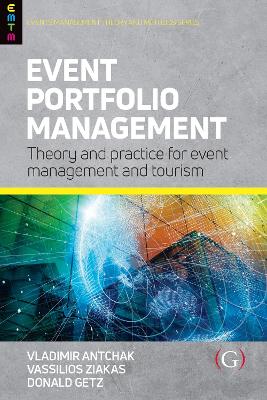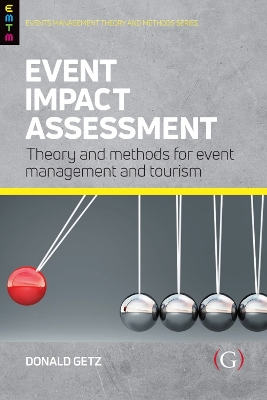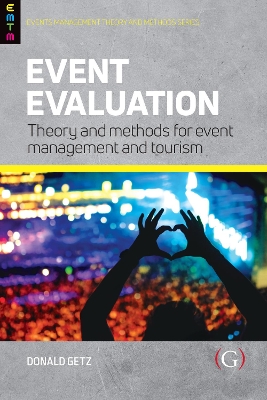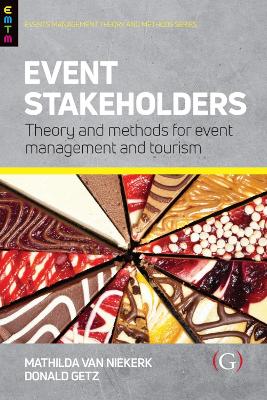Events Management and Methods
4 total works
Event Portfolio Management
by Vladimir Antchak, Vassilios Ziakas, and Professor Donald Getz
Published 1 September 2019
Event Portfolio Management: Theory and practice for event management and tourism provides the reader with a concise introduction to portfolio theory and methods for use in event management and event tourism. Divided into 2 parts of ‘Theory’ and ‘Practice’ it explains why it is important in event studies and management, and then shows how related methods can be used and adapted using real world international case studies.
Event Portfolio Management focuses on the application of portfolio theory, using empirical evidence and further exploring the instrumental use and value of event portfolios. It discusses how portfolio theory can be linked to generic theories of strategic management and a number of event-tourism strategies, risk assessment, impact and cost/benefit evaluation. With a wide geographical reach, it examines different case studies from Europe, Asia, North America and Australasia.
Part of The Management Theory and Methods for Event Management and Event Tourism Series. This series examines the extent to which mainstream theory is being employed to develop event-specific theory, and to influence the very core practices of event management and event tourism. Each compact volume contains overviews of mainstream management theories and methods, examples from the events literature, case studies, and guidance on all aspects of planned-event management. They introduce the theory, show how it is being used in the events sector through a literature review, incorporate examples and case studies written by researchers and/or practitioners, and contain methods that can be used effectively in the real world.
Series editor: Donald Getz PhD., Professor Emeritus, University of Calgary, Canada.
With online resource material, this mix-and-match collection is ideal for lecturers who need theoretical foundations and case studies for their classes, by students in need of reference works, by professionals wanting increased understanding alongside practical methods, and by agencies or associations that want their members and stakeholders to have access to a library of valuable resources.
For both events students and practitioners, this will be an indispensable specialist text and reference.
Event Portfolio Management focuses on the application of portfolio theory, using empirical evidence and further exploring the instrumental use and value of event portfolios. It discusses how portfolio theory can be linked to generic theories of strategic management and a number of event-tourism strategies, risk assessment, impact and cost/benefit evaluation. With a wide geographical reach, it examines different case studies from Europe, Asia, North America and Australasia.
Part of The Management Theory and Methods for Event Management and Event Tourism Series. This series examines the extent to which mainstream theory is being employed to develop event-specific theory, and to influence the very core practices of event management and event tourism. Each compact volume contains overviews of mainstream management theories and methods, examples from the events literature, case studies, and guidance on all aspects of planned-event management. They introduce the theory, show how it is being used in the events sector through a literature review, incorporate examples and case studies written by researchers and/or practitioners, and contain methods that can be used effectively in the real world.
Series editor: Donald Getz PhD., Professor Emeritus, University of Calgary, Canada.
With online resource material, this mix-and-match collection is ideal for lecturers who need theoretical foundations and case studies for their classes, by students in need of reference works, by professionals wanting increased understanding alongside practical methods, and by agencies or associations that want their members and stakeholders to have access to a library of valuable resources.
For both events students and practitioners, this will be an indispensable specialist text and reference.
Impact assessment can be highly technical and complex, requiring a broad knowledge base and diverse skills, but like evaluation, it is a process fraught with philosophical, technical and political perils. Why is it done, by whom, and how, must be carefully planned. Impacts cannot always be ’proven’, so the nature of evidence becomes critical. Accordingly, a strong theoretical base is needed by all IA practitioners.
Whilst economic impacts have received a great deal of attention, with sufficient material available to guide all applications, for social, cultural and environmental IA the theory and practice has lagged. In the context of Triple Bottom Line, social responsibility and sustainability approaches most of the available literature is on normative goals (such as going green, meeting sustainability standards), the nature of positive and negative impacts (a descriptive approach or based on public input), or theory about how impacts occur; very little theory development or praxis has been directed at impact assessment for these applied fields.
In response to this lack of information, Event Impact Assessment is the first text to:
• Develop professionalism for IA and evaluation in these applied management fields.
• Position impact assessment within sustainability and responsibility paradigms.
• Recommend goals, methods and measures for planning, evaluation and impact assessment pertaining to events and tourism.
• Encourage the adoption of standard methods and key performance indicators in evaluation and impact assessment in order to facilitate valid comparisons, benchmarking, reliable forecasts, transparency and accountability.
• Provide concepts and models that can be adapted to diverse situations.
• Connect readers to the research literature through use of Research Notes and provision of additional readings.
This text also works well as a companion text to Event Evaluation: Theory and methods for event management and tourism.
The Events Management Theory and Methods Series examines the extent to which mainstream theory is being employed to develop event-specific theory, and to influence the very core practices of event management and event tourism. Each compact volume contains overviews of mainstream management theories and methods, examples from the events literature, case studies, and guidance on all aspects of planned-event management. They introduce the theory, show how it is being used in the events sector through a literature review, incorporate examples and case studies written by researchers and/or practitioners, and contain methods that can be used effectively in the real world. Series editor: Donald Getz.
With online resource material, this mix-and-match collection is ideal for lecturers who need theoretical foundations and case studies for their classes, by students in need of reference works, by professionals wanting increased understanding alongside practical methods, and by agencies or associations that want their members and stakeholders to have access to a library of valuable resources.
Whilst economic impacts have received a great deal of attention, with sufficient material available to guide all applications, for social, cultural and environmental IA the theory and practice has lagged. In the context of Triple Bottom Line, social responsibility and sustainability approaches most of the available literature is on normative goals (such as going green, meeting sustainability standards), the nature of positive and negative impacts (a descriptive approach or based on public input), or theory about how impacts occur; very little theory development or praxis has been directed at impact assessment for these applied fields.
In response to this lack of information, Event Impact Assessment is the first text to:
• Develop professionalism for IA and evaluation in these applied management fields.
• Position impact assessment within sustainability and responsibility paradigms.
• Recommend goals, methods and measures for planning, evaluation and impact assessment pertaining to events and tourism.
• Encourage the adoption of standard methods and key performance indicators in evaluation and impact assessment in order to facilitate valid comparisons, benchmarking, reliable forecasts, transparency and accountability.
• Provide concepts and models that can be adapted to diverse situations.
• Connect readers to the research literature through use of Research Notes and provision of additional readings.
This text also works well as a companion text to Event Evaluation: Theory and methods for event management and tourism.
The Events Management Theory and Methods Series examines the extent to which mainstream theory is being employed to develop event-specific theory, and to influence the very core practices of event management and event tourism. Each compact volume contains overviews of mainstream management theories and methods, examples from the events literature, case studies, and guidance on all aspects of planned-event management. They introduce the theory, show how it is being used in the events sector through a literature review, incorporate examples and case studies written by researchers and/or practitioners, and contain methods that can be used effectively in the real world. Series editor: Donald Getz.
With online resource material, this mix-and-match collection is ideal for lecturers who need theoretical foundations and case studies for their classes, by students in need of reference works, by professionals wanting increased understanding alongside practical methods, and by agencies or associations that want their members and stakeholders to have access to a library of valuable resources.
This is the first textbook and reference work on evaluation intended for event management and
event tourism. Drawing upon generic evaluation theory and methods, event and tourism research
and real-world experiences, the author provides concepts and tools needed for the establishment of a comprehensive evaluation system and the implementation of varied evaluation projects.
The strength of this book lies in its emphasis on evaluation foundations, both theoretical and
methodological, enabling the student and practitioner to adapt the evaluation process to many
situations using:
*A range of tools from simple checklists to more advanced logic models;
*Specific chapters devoted to the most challenging evaluation contexts: the visitor and their
experience, quality and human resources;
*A chapter devoted to exploring different evaluation challenges in the full range of planned
events, including the tourism dimension;
*An introduction of impact assessment.
The Events Management Theory and Methods Series examines the extent to which mainstream theory is being employed to develop event-specific theory, and to influence the very core practices of event management and event tourism. Each compact volume contains overviews of mainstream management theories and methods, examples from the events literature, case studies, and guidance on all aspects of planned-event management. They introduce the theory, show how it is being used in the events sector through a literature review, incorporate examples and case studies written by researchers and/or practitioners, and contain methods that can be used effectively in the real world. Series editor: Donald Getz.
With online resource material, this mix-and-match collection is ideal for lecturers who need theoretical foundations and case studies for their classes, by students in need of reference works, by professionals wanting increased understanding alongside practical methods, and by agencies or associations that want their members and stakeholders to have access to a library of valuable resources.
event tourism. Drawing upon generic evaluation theory and methods, event and tourism research
and real-world experiences, the author provides concepts and tools needed for the establishment of a comprehensive evaluation system and the implementation of varied evaluation projects.
The strength of this book lies in its emphasis on evaluation foundations, both theoretical and
methodological, enabling the student and practitioner to adapt the evaluation process to many
situations using:
*A range of tools from simple checklists to more advanced logic models;
*Specific chapters devoted to the most challenging evaluation contexts: the visitor and their
experience, quality and human resources;
*A chapter devoted to exploring different evaluation challenges in the full range of planned
events, including the tourism dimension;
*An introduction of impact assessment.
The Events Management Theory and Methods Series examines the extent to which mainstream theory is being employed to develop event-specific theory, and to influence the very core practices of event management and event tourism. Each compact volume contains overviews of mainstream management theories and methods, examples from the events literature, case studies, and guidance on all aspects of planned-event management. They introduce the theory, show how it is being used in the events sector through a literature review, incorporate examples and case studies written by researchers and/or practitioners, and contain methods that can be used effectively in the real world. Series editor: Donald Getz.
With online resource material, this mix-and-match collection is ideal for lecturers who need theoretical foundations and case studies for their classes, by students in need of reference works, by professionals wanting increased understanding alongside practical methods, and by agencies or associations that want their members and stakeholders to have access to a library of valuable resources.
This new text and reference focuses on stakeholder theory applied to event management and goes beyond traditional approaches by treating event management as an applied field.
The book goes further than the economic impacts of events, and looks with a new perspective at issues such as-
• The relationships between stakeholders and the consequences that such relationships create
• An approach strongly rooted in management and the commonly-recognized management functions of planning, organizing, staffing, directing and controlling
• Introducing throughout the relevant theory and showing how theory is being used in the events sector
The book uses a wide range of relevant examples and case studies that will be relatable to the real world. Online resources will also be included, such as annotated bibliographies, lists of further readings and periodicals, and relevant websites. It will be an essential introduction for all events students and practitioners
The Events Management Theory and Methods Series examines the extent to which mainstream theory is being employed to develop event-specific theory, and to influence the very core practices of event management and event tourism. Each compact volume contains overviews of mainstream management theories and methods, examples from the events literature, case studies, and guidance on all aspects of planned-event management. They introduce the theory, show how it is being used in the events sector through a literature review, incorporate examples and case studies written by researchers and/or practitioners, and contain methods that can be used effectively in the real world. Series editor: Donald Getz.
With online resource material, this mix-and-match collection is ideal for lecturers who need theoretical foundations and case studies for their classes, by students in need of reference works, by professionals wanting increased understanding alongside practical methods, and by agencies or associations that want their members and stakeholders to have access to a library of valuable resources.
The book goes further than the economic impacts of events, and looks with a new perspective at issues such as-
• The relationships between stakeholders and the consequences that such relationships create
• An approach strongly rooted in management and the commonly-recognized management functions of planning, organizing, staffing, directing and controlling
• Introducing throughout the relevant theory and showing how theory is being used in the events sector
The book uses a wide range of relevant examples and case studies that will be relatable to the real world. Online resources will also be included, such as annotated bibliographies, lists of further readings and periodicals, and relevant websites. It will be an essential introduction for all events students and practitioners
The Events Management Theory and Methods Series examines the extent to which mainstream theory is being employed to develop event-specific theory, and to influence the very core practices of event management and event tourism. Each compact volume contains overviews of mainstream management theories and methods, examples from the events literature, case studies, and guidance on all aspects of planned-event management. They introduce the theory, show how it is being used in the events sector through a literature review, incorporate examples and case studies written by researchers and/or practitioners, and contain methods that can be used effectively in the real world. Series editor: Donald Getz.
With online resource material, this mix-and-match collection is ideal for lecturers who need theoretical foundations and case studies for their classes, by students in need of reference works, by professionals wanting increased understanding alongside practical methods, and by agencies or associations that want their members and stakeholders to have access to a library of valuable resources.



